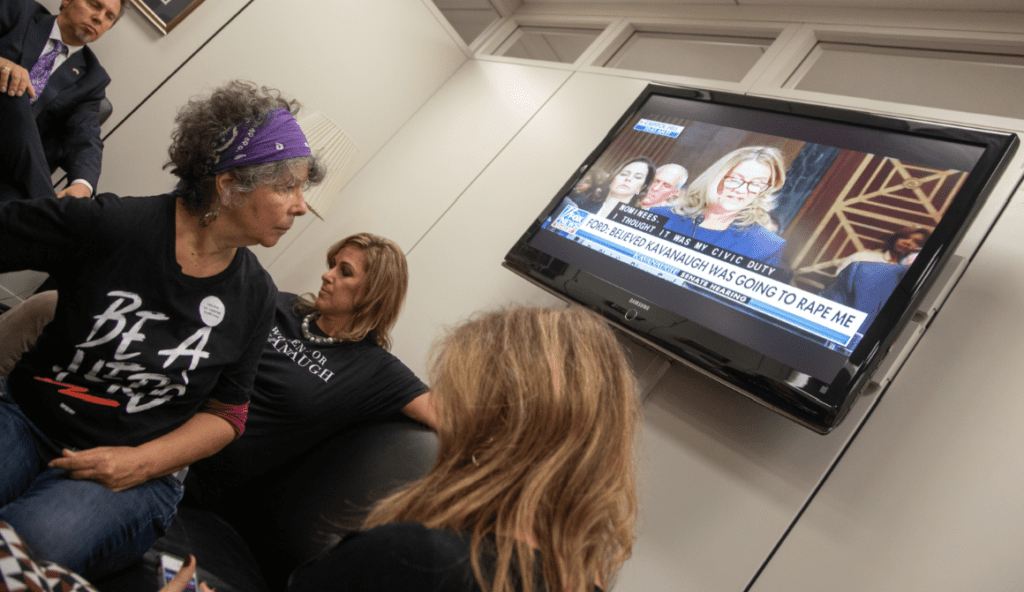Political Floodwaters Rise With Kavanaugh Hearing
By • October 1, 2018 0 550

The tidal wave of time stopped last Thursday, Sept. 27, then crashed over a special Supreme Court confirmation hearing and a riveted audience of millions of Americans for the better part of the day.
Left standing and revealed in the backwash was the true, angry and anguished state of partisan politics in the United States as it exists today, exacerbated by what happened and what was said and how it was said.
Eagerly awaited for days, with momentum and interest stoked by the media and the internet, not to mention the president himself, the hearing still managed to surprise in its degree of intensity and anger and emotion, its machinations and ebb and flow and the constant buzz of media (including social media) commentary.
The hearing had already dominated the 24-7 news cycle, which did not lack for stories of its own if you were paying attention at all. In South Carolina and North Carolina, survivors of Hurricane Florence surveyed with stoic lamentation the loss of life and livelihood, home and hearth and precious possessions.
In the District of Columbia, the city experienced a rash of shootings and murders that might, on some weekends, make Chicago blush.
Leading into the hearing, President Donald Trump gave one of those rambling, torturous press conference at the United Nations, full of exaggerations and banter with the press. He also gave a perhaps unintended preview of just what kind of cultural and social forces were at work in the age of #MeToo, when he questioned why college professor Christine Blasey Ford, who had accused Judge Brett Kavanaugh of sexually assaulting her at a party in the 1980s when they were teenagers, had not gone to the police.
This comment produced a torrent of emails and tweets by women who had similar experiences and kept silent out of shame, fear and trauma for years. This was a loud hint how much anger might be out there awaiting the midterm elections, which loomed ever closer on the horizon.
By the time the hearing opened, you could see the dilemma faced by Republicans: the possible spectacle of Republican committee members interrogating a woman about sexual assault.
The committee did two things. First, they all agreed that Ford deserved respect and that she was credible — each and every one, not to mention the president himself. Then, they hired sex-crimes prosecutor Rachel Mitchell to question her about her claims.
Mitchell took the quiet road in her questioning, methodical, but not unduly interrogatory, not spending much time on the details of the accusation (groping, pillow over mouth, forced down onto a bed by Kavanaugh and his friend). Her questions, while fraught with tension, did not reverberate.
Ford’s testimony did.
While we had read about her and knew some details of her life — that she went to Holton Arms in Bethesda, while Kavanaugh went to Georgetown Prep — we had not seen her in the flesh and the present, except for an old high school picture of a sun-bright teenaged girl.
None of that prepared you for Ford herself, as she prepared to testify. While Grassley tried to be solicitous, asking how she felt, she said, “I’m terrified.” She brushed aside her hair, asked for coffee.
There was nothing about her that seemed in any way rehearsed. Asked how certain she was of Kavanaugh’s identity as her attacker, she said, with no shakiness in her voice, “100 percent.” She said the most the terrible part of her experience was the sound of the boys’ laughter.
Kavanaugh, too, arrived as someone we had not seen before. Angry, strong, confident, he also took the position that he was “100-percent sure” that he did none of the things he was accused of, that he was not at the house or in the room. He presented himself as both self-confident, and, oddly, as a victim — and, more than that, the subject of persecution by the Democratic Party.
He was sharply questioned by Democrats about his drinking, about parties, about blackouts, about his sexual life. “I like beer,” he said, repeatedly (so much so, given American culture, that when one of those beer commercials in which a group of people sing “I like beer” comes on, people will look for him in the crowd). Faced with a question about whether the FBI should further investigate before the Senate voted to confirm him, he was silent.
He talked about his family and brought up his young daughter, who said that they should pray for “the woman.” He came close to tears several times. He lashed out at the Democrats, something that South Carolina Senator Lindsey Graham agreed with, blasting the Dems and saying the hearing was “hell,” in a vitriolic and memorable outburst.
Watching the whole thing was excruciating and exhausting, so much so that people probably fell asleep during the season-opening episode of “Murphy Brown” that night. Time that day had indeed stopped. It was to some extend a wounding experience from which it was difficult to return to normalcy.
The hearing — factually in that there is a contested and ongoing further FBI investigation until Friday — continues. It goes on every day and night, and it seems that now that the whole country has stepped into this particular floodwater of argument, there is no returning to the safety of the shore, no matter whether the judge is confirmed as a higher judge or not. From here until November — and beyond that, depending — we are set on a course of unmapped whitewater political rafting.

